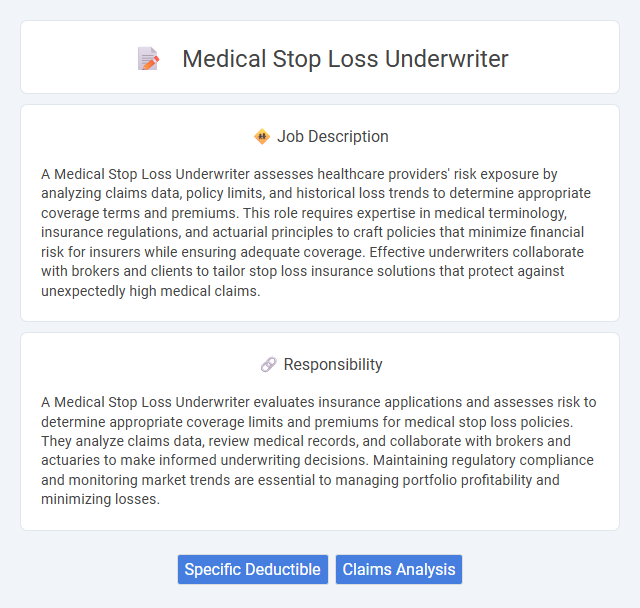
A Medical Stop Loss Underwriter assesses healthcare providers' risk exposure by analyzing claims data, policy limits, and historical loss trends to determine appropriate coverage terms and premiums. This role requires expertise in medical terminology, insurance regulations, and actuarial principles to craft policies that minimize financial risk for insurers while ensuring adequate coverage. Effective underwriters collaborate with brokers and clients to tailor stop loss insurance solutions that protect against unexpectedly high medical claims.
Individuals with strong analytical skills and a keen interest in healthcare trends will likely be well-suited for a Medical Stop Loss Underwriter role. Those comfortable with risk assessment and detailed data evaluation may find themselves proficient in determining coverage terms for high-cost medical conditions. Conversely, candidates who struggle with complex data or lack attention to detail might face challenges in fulfilling the responsibilities of this position effectively.
Qualification
A Medical Stop Loss Underwriter typically requires a bachelor's degree in finance, insurance, health administration, or a related field, with strong analytical and risk assessment skills. Professional certifications such as Chartered Property Casualty Underwriter (CPCU) or Associate in Claims (AIC) enhance credibility and industry knowledge. Experience in healthcare insurance, underwriting, or loss control is critical for evaluating complex medical risk portfolios and determining appropriate coverage limits.
Responsibility
A Medical Stop Loss Underwriter evaluates insurance applications and assesses risk to determine appropriate coverage limits and premiums for medical stop loss policies. They analyze claims data, review medical records, and collaborate with brokers and actuaries to make informed underwriting decisions. Maintaining regulatory compliance and monitoring market trends are essential to managing portfolio profitability and minimizing losses.
Benefit
Medical stop loss underwriters likely play a critical role in managing financial risk by evaluating insurance applications and determining coverage limits. Their work probably ensures that insurance providers can safeguard against high-cost claims, benefiting both insurers and policyholders. This risk assessment likely contributes to stable premium pricing and improved financial predictability within the healthcare insurance market.
Challenge
Medical stop loss underwriter roles likely involve navigating complex risk assessment challenges in the healthcare insurance sector. Professionals probably face difficulties in accurately predicting high-cost claims while balancing the financial exposure for insurers. They might also manage evolving regulations and data uncertainties that increase the complexity of underwriting decisions.
Career Advancement
A Medical Stop Loss Underwriter evaluates and manages risk for self-funded health plans, specializing in assessing high-cost medical claims to protect insurance carriers from excessive losses. Expertise in data analysis, risk assessment, and regulatory compliance enhances career growth opportunities, leading to senior underwriter roles, risk management director positions, or executive roles in insurance companies. Developing proficiency in actuarial science, negotiation skills, and market trend analysis further advances professional standing within the medical stop loss insurance sector.
Key Terms
Specific Deductible
A Medical stop loss underwriter evaluates risk and determines premiums based on the specific deductible, which is the threshold an employer pays before coverage begins for individual high-cost claims. Accurate assessment of the specific deductible ensures appropriate premium pricing and limits potential losses by forecasting claim severity. Expertise in analyzing historical claims data and industry trends is essential for optimizing stop loss policies and maintaining profitability.
Claims Analysis
Medical stop loss underwriters specialize in analyzing complex claims data to assess risk and determine appropriate coverage limits for self-funded health plans. They utilize advanced actuarial models and historical claims trends to evaluate potential high-cost medical events, ensuring optimal balance between risk exposure and premium pricing. Proficiency in data analytics and regulatory compliance is crucial for accurate underwriting decisions and mitigating financial losses.
 kuljobs.com
kuljobs.com